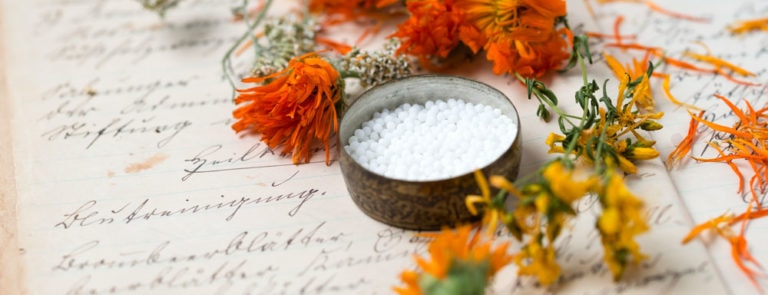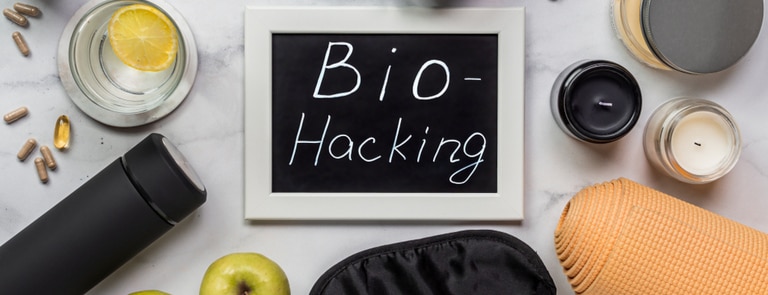If you’ve ever seen homeopathic remedies in the shops but have no idea what they are or how they work, we’ve got all the answers
Written by Charlotte Haigh on January 22, 2019
Reviewed by Carolina Brooks on January 27, 2019
Homeopathy has had a bad rap of late, as some scientists and health professionals claim the therapy is unproven and doesn’t work. Yet it still has legions of fans, including the Royal family.
If you’ve been curious about homeopathy but never tried it – or you’ve given it a go and found it helpful, without really being sure how it works – read on for the lowdown.
What is homeopathy?
Homeopathy is an alternative or complementary medicine (CAM), based on the idea that ‘like cures like’.
1 In other words, taking a substance in tiny amounts can help address the symptoms that it would cause when taken in large amounts – a similar idea to vaccinations.
Homeopathy was developed by German doctor Samuel Hahnemann in the late 18
th century. He developed a series of dilutions and sucussions (vigorously shaken preparations) of toxic substances such as arsenic until levels of the original substance were undetectable. Hahnemann’s theory was that the more diluted the substance, the greater its ability to treat.
2
The holistic nature of homeopathy means homeopaths – those who practise homeopathy – treat the whole person, not just the condition. This means two people could see a practitioner about the same illness but could be given totally different remedies depending on their personalities and symptoms, and how that matches with the homeopathic ‘picture’ – the remedy that most closely matches their ailment.
3
How many people use homeopathy?
Around 200 million people are thought to use homeopathy worldwide, and for a long time it was available on the NHS.
4 However, in 2017 NHS England advised GPs and other healthcare practitioners to stop prescribing it.
5 The move followed a 2010 House of Commons report, which found no evidence that homeopathic remedies performed any better than placebos.
6
How does homeopathy work?
Despite the ruling, homeopathy still has firm fans – including Prince Charles; at one point there was even a court homeopath! The British Homeopathic Association also points out there are scientific theories behind how it works.
The strongest support is for the idea that the water in which the substance is diluted and succussed has a ‘memory’ of the substance. Research by one chemist found the structure of the hydrogen bonds in homeopathic solutions is different from that in plain water.
7 Other scientists have been able to distinguish between different remedies and dilutions, despite the fact that, in theory, they should all just be water.
8
It may be hard to get your head around the idea, but there is evidence that highly diluted substances have an effect. For example, one French study found high dilutions of histamine – a substance produced in the body during allergic reactions – had a measurable effect on a type of white blood cell.
9
What’s the evidence for homeopathy?
People tend to seek out homeopathy to help them deal with long-term conditions such as asthma, allergies, arthritis, depression and anxiety, dermatitis (a skin condition) and ear infections.
10
In clinical trials, one study carried out by the University of Oslo, Norway, found the remedy Betula 30c could help relieve symptoms in those with a birch pollen allergy.
11 And in 2007, Ukrainian researchers discovered that patients with sinusitis taking the homeopathic remedy Sinfrontal experienced a reduction (and in some cases a reversal) of their symptoms.
12
Other studies have tentatively suggested that homeopathic remedies could help ease symptoms of a range of conditions, including insomnia, flu, PMS, childhood diarrhoea, menopause symptoms and fibromyalgia.
13
Using homeopathy
If you want to try homeopathy, it’s best to find a practitioner first as remedies are prescribed individually, according to your constitution and symptoms.
At your first appointment, the homeopath will ask lots of questions about everything from your diet and sleeping habits to your personality. They’ll then give you a homeopathic prescription, usually as tiny pills known as pillules, but sometimes as a liquid, powder or topical cream.
14
What are the side-effects of homeopathy?
Homeopathy is considered non-addictive and safe during pregnancy, breast-feeding and for babies and young children.
15 There is only a small risk of side effects,
16 but you should talk to your doctor before stopping other treatment in favour of homeopathy.
Shop Remedies
Advice is for information only and should not replace medical care. Please check with your GP before trying any remedies.
Sources
1. NHS. Homeopathy
2. British Homeopathic Association. History
3. British Homeopathic Association. What is homeopathy?
4. As above
5. Laura Donnelly. The Telegraph. High Court backs NHS decision to stop funding homeopathy
6. As Source 1
7. Rey L. Thermoluminescence of ultra-high dilutions of lithium chloride and sodium chloride
8. Rao ML, et al. The defining role of structure (including epitaxy) in the plausibility of homeopathy
9. Belon P, et al. Histamine dilutions modulate basophil activation
10. As Source 1
11. Aabel S. Prophylactic and acute treatment with the homeopathic medicine, Betula 30c for birch pollen allergy: a double-blind, randomized, placebo-controlled study of consistency of VAS responses
12. Zabolotnyi DI, et al. Efficacy of a complex homeopathic medication (Sinfrontal) in patients with acute maxillary sinusitis: a prospective, randomized, double-blind, placebo-controlled, multicenter clinical trial
13. British Homeopathic Association. Evidence
14. British Homeopathic Association. Treatment
15. British Homeopathic Association. Is homeopathy safe?
16. As Source 1 



